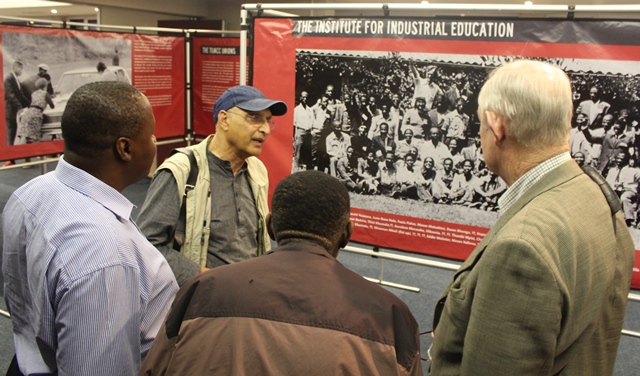Durban University of Technology (DUT) hosted the 40th anniversary of South Africa’s most popular labour publication, the South African Labour Bulletin (SALB), at the Hotel School, Ritson campus on Monday, 10 November 2014.
SALB is the only alternative anti-apartheid publication which survived into South Africa’s new democracy, which has become a resource for key players within the labour movement and those analysing trends within the broader labour market.
It was formed at the height of apartheid in 1974 by Richard Turner, when labour movements were being suppressed and labour activists detained, banned and even murdered. The SALB journal provides information and critical analysis and debates on a variety of social issues, such as labour, politics, economics, health, education, sport, youth, women, HIV/AIDS, the environment, culture and book reviews. Through its bold reportage the Bulletin aims to advance the discourse of progressive politics and promote social justice and the interests of the working class.
The event was held in partnership with DUT and the Workers’ College. The Workers’ College is an education organisation that offers educational programmes for trade unionists and community activists from within South Africa as well as the African continent.
Guests in attendance were DUT’s Vice-Chancellor and Principal Prof Ahmed Bawa, UCT’s Prof Ari Sitas, Alec Erwin, Mandla Sibiya, Kassie Moodley and editor of SALB, Eliijah Chiwota, and various academics and stakeholders.
The evening’s programme kicked off with guests viewing an exhibition dedicated to all those who were killed, banned, banished and persecuted, and all those who took collective action, in the struggle for trade union rights and worker democracy and freedom. Exhibition curators Omar Badsha and Jeeva Rajgopaul wanted guests to experience a ‘piece of history’ by exhibiting some of their own collection of historic photos and the trials and tribulations experienced by the trade union recruiters and union members at various times in pre-apartheid South Africa.
Prof Ari Sitas from the University of Cape Town (UCT) was master of ceremonies who was an activist in the Anti-Apartheid movement. He stressed that 40 years was a long time for the SALB to be relevant. “We are here to celebrate the tenacity of people who built the trade union movement,” he added.
Also speaking at the event, Prof Bawa said it was a fantastic occasion for DUT to have partnered with the Workers’ College. “Partly, it’s also sad for remembering the past of apartheid but on the other hand it’s also a wonderful occasion to remember where we come from and all the struggles that we fought and are still to come. This is a fantastic opportunity for DUT to form partnerships and we are so happy to be working with the Workers’ College and hope to continue the relationship,” he said.
Alec Erwin said for the SALB to have survived 40 years was quite an achievement in such a past political environment like South Africa’s. He also thanked the late activist Rick Turner for his contribution to the SALB.
“The first articles in the SALB were done by Rick Turner, so we must pay tribute to him for all his hard work. I also feel privileged to be part of such a history. Back in the day, you stood at the gate at 5am at the factories, and you started talking just to recruit one or two. So it’s so important for the youth to understand the struggles of the unions, especially since trade unions were the strongest in KwaZulu-Natal,” he said.
Alec Erwin was the former Minister of Trade and Industry and Minister of Public Enterprises. Between 1973 and 1975, Erwin served as a member of the Institute of Industrial Education. After the 1973 Durban strikes, Erwin was part of the group of White activists from the National Union of South African Students (NUSAS) who participated and held positions in the African trade unions that were subsequently formed.
Giving more insight into the journal, Elijah Chiwota, SALB Editor said: “The Bulletin’s mission is to be a media that advances progressive politics and promotes social justice by providing accessible and engaging information, critical analyses and debates on issues and challenges that confront workers, their organisations and communities. Issues of women and gender at the workplace are other areas of focus. My role as an editor is to highlight the struggles, we looked at unions at what they were doing, for example, 20 years ago which is still relevant now.”
After the formalities were over, a free mike session was held with guests giving poetry recitals, story-telling as well as the singing of freedom songs. Entertainment was provided by the dynamic group, the Internationale jazz band. Dr Kira Erwin ended off the night’s celebrations with a vote of thanks, expressing her gratitude to those who had made the event possible.
– Waheeda Peters
Pictured: Omar Badsha talking to guests about the trade unions in the pre-apartheid era.


